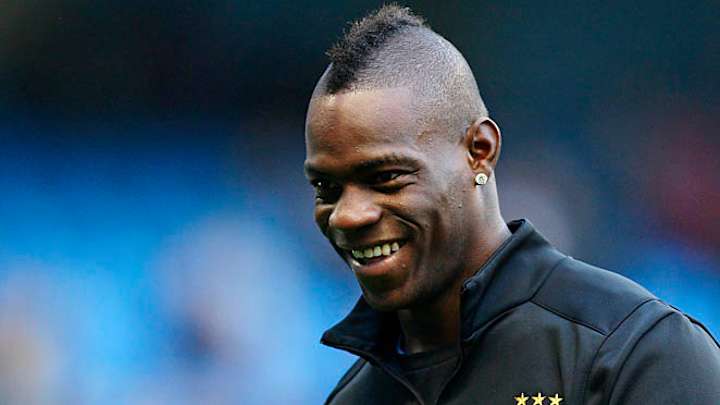Balotelli's exit from Manchester City reflects worst on Mancini


Vincenzo Esposito used to coach a young Mario Balotelli for Inter Milan's youth team and remembers the striker walking out of school mid-lessons with no explanation.
"The day before a really important match, I had drummed home to the players how important preparation is," Esposito told So Foot last year. "Mario went out looking for an enormous ice cream, and he returned and licked it right in front of me."
Balotelli graduated from ice creams to fireworks during his combustible two-and-a-half years at Manchester City. Famously, he reportedly caused considerable damage to his house by letting off fireworks from outside his bathroom window the night before City beat Manchester United 6-1 at Old Trafford (sources close to him have since claimed it was brother Enoch). The next day he secured his legend in the club's history, scoring a superb opening goal, slowly turning around and lifting up his T-shirt to reveal the slogan, "Why Always Me?"
Six months later, in the final minute of the last day of the season, he made his first assist, playing through Sergio Aguero to score the goal that beat Queens Park Rangers 3-2 and won City the Premier League title. Last summer, he was outstanding for Italy at Euro 2012, scoring two goals that knocked out Germany in the semifinal.
CREDITOR: Americans affected by transfer window
Wednesday, though, he will have a medical before following the path of another expensive City forward, Robinho, to AC Milan (the two players also share an agent, Mino Raiola), for a reported ?20 million. The transfer robs the Premier League of one of its great eccentrics but also reflects poorly on coach Roberto Mancini, whose various management methods -- lurching between carrot and stick, defending and then attacking the player (earlier this month, the pair had a punch-up in training, during which a wide-eyed Mancini looked out of control) -- have failed.
The knock against Mancini in Italy was his continued failure in Europe -- which happens to have continued at City. His successor at Inter Milan, Jose Mourinho, won the 2010 Champions League with, as Mancini put it, "the team I built," but Mourinho did have one failure on his card: Balotelli. For Mancini, getting the best out of Balotelli was also getting one over on Mourinho. But scrapping with Balotelli in the pouring Manchester rain, after two years of (mostly) backing him? Mourinho comes out on top again.
This season, Balotelli has started only seven league games, but not in his best position as center forward. Instead, for four games he covered on the right hand side in the absence of the injured David Silva, and in another, for Samir Nasri on the left. After the high of the summer, Mancini has hardly given him the opportunity to play to his potential. The form of Carlos Tevez at the start of the season, and Edin Dzeko more recently, has also hindered his chances. Instead, the constant battles, not helped by City's training ground being visible as it backs onto a public footpath, have worn down both men, and this was the inevitable conclusion.
The next question: How will Balotelli cope back in Milan? He will be surrounded by friends and family, and partnering Milan sensation Stephan El-Shaarawy, with whom he impressed for Italy in its recent 2-1 loss to France. Rather than the support of one man, Mancini, at City, maybe Milan as a club will give him the backing he needs to fulfil his potential. Last week, Italy coach Cesare Prandelli suggested that he was able to get Balotelli playing well because he didn't see him every day.
"That's my advantage over Mancini, I work with him for brief periods," he told Gazzetta dello Sport. "But the hope remains the same, that Mario finally invests in himself; that he says, OK, now is the time to become the best in the world; that he only allows the footballer to speak."
The worry is that the Balotelli, who briefly united Italy last summer, will again be the victim of racist abuse that peppered his spell with Inter. He spoke positively of the multi-culturalism in English stadia but is uncomfortable being a poster-boy for racial issues.
"I'm just a very small part of a very big world," he has said. "I can't change people's attitudes."
If anything, the problem of racism in Italian football has worsened since Balotelli left: witness the recent stand taken by his new teammate, Kevin-Prince Boateng, who walked off during a recent friendly in the face of abusive chants from the crowd. The support Boateng received from Milan in the aftermath, at least, bodes well for Balotelli.
Most of all, though, the British press will miss him: headlines involving Balotelli have included the words, "throwing darts," "women's prison," "school toilet dash," "burned house" and "randy dwarf" (luckily, not all in the same story), and it got to the point, as Iain Macintosh wrote on PickOurTeam, where almost anything concerning Balotelli would be credible.
"Mario Balotelli has just been spotted riding [an elephant] through the streets of Manchester, throwing [cans of beans] at [old age pensioners]."
Balotelli's departure may solve one headache for Mancini, but it creates another: City has two days to buy a replacement, if it wants one. More significantly, though, Mancini's inability to turn Balotelli into a success at City is another black mark against his name. With a second successive European failure already on the board and losing the title race to United a possibility, the coach is running out of arguments to keep his place on the bench next season.
WAHL: U.S.-Canada preview
